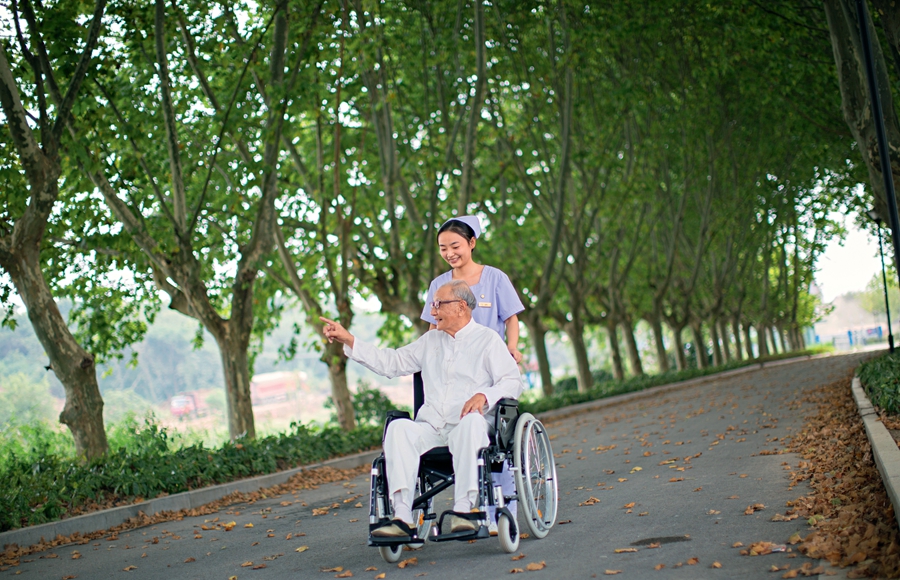By staff reporter DANG XIAOFEI
By staff reporter DANG XIAOFEI
IN recent years, senior care providers from overseas have begun to dig into the Chinese market. Among them, French company Orpea has achieved remarkable results: the occupancy rate of its first senior care center in Nanjing, opened in 2016, has exceeded 50 percent. “Although it has not yet started to make profit, it is not far from there, and it will surely be profitable in the future; otherwise we would not have stayed in China,” Nathaniel Farouz, CEO of Orpea China, said with confidence.
As the largest senior care provider in Europe, Orpea officially entered the Chinese market in 2013 and quickly established itself as an industry leader in just a few years. What are the lessons behind its success? To this end, China Today interviewed Nathaniel Farouz.
Market Research and Positioning
When he first started doing business in China, Farouz was challenged by his peers. “You are a foreigner who does not know Chinese people, and services you provide may not meet the needs of Chinese consumers. Just go back.” Too many times has he heard similar comments, but little did these people know that Orpea had been studying and researching China’s senior care market for three years before making its official entry.

Orpea provides a range of services to partly disabled seniors in China.
Farouz clearly has his own view on the Chinese senior care market: public nursing homes are more suitable for elders who have not yet reached a very advanced age and who still have the ability to take care of themselves; senior care centers invested and developed by real estate and insurance companies are mainly targeted at wealthy seniors, most of whom in good health conditions. The market gap of providing services to disabled elders will be where Orpea can play a role.
In view of this, the positioning of Orpea is clear – to target high-end consumers, mainly the disabled, partly disabled, and cognitively impaired elderly. Orpea has already opened Orpea Xianlin International Care Center in Nanjing. The residents, with an average age of around 85, need to pay an average of more than RMB 20,000 per month.
Is there a market for the “outrageously expensive” nursing homes? “China currently does not have a mature, high-end elder care market, but this does not mean there is no potential market or no senior consumers with such demand,” Farouz said. The successful operation of Orpea in Nanjing confirmed that his judgment about the market was correct.
The success is based on Orpea’s ability to quickly sniff out business opportunities through market research and to enter the Chinese market in a timely manner. “We found China’s senior care market to have great potential,” said Farouz. According to China’s National Committee on Aging, by the end of 2017, the number of elderly people aged 60 and above in China was 241 million, or 17.3 percent of the total population. The number is expected to peak around 2050, with the proportion reaching 34.9 percent.
The rapid growth of China’s aging population has created a huge demand for senior care in China, which also means encouraging market prospects. A plan for the development of China’s senior care industry said that the total value of the country’s senior care industry will exceed RMB 10 trillion by 2030. All this gives more impetus to Orpea to continue its operation in China.
“Orpea regards its growth in China as a long-term strategy. We are planning to develop projects in a number of major first- and second-tier cities in China,” said Farouz. Orpea Group is now actively looking for properties compliant with its standards in Beijing, Shanghai, and surrounding cities and regions, and seeking cooperation with Chinese real estate agencies, insurance companies, and medical care institutions. The group’s global headquarters also decided to formally introduce mental health care services as part of its business to China, providing rehabilitation and medical services with European standards for the elderly and sick in China.
It is worth mentioning that during the visit of French President Emmanuel Macron to China, Orpea and Taikang Community, a subsidiary of Chinese insurance and financial service group Taikang, signed a strategic cooperation agreement, with plans to set up a joint venture in China to run and expand urban nursing homes and rehabilitation centers.
Refined Services
The rest area can be seen everywhere, with protective padding attached to sharp edges of furniture. Indoor lighting is warm and cozy, and flower beds are of the same height as wheelchairs for the elderly. Living and nursing plans are tailored for each individual, with spas, multi-sensory environment therapy, cognitive training and many other professional non-pharmacological therapies. The services at Orpea Xianlin International Care Center are provided with intensive attention to every detail.
“Orpea has high requirements on quality of each individual service item. We improve our service each day and pay great attention to details,” Farouz emphasized.

Each living and nursing plan is tailored to the individual.
It was precisely because of the refined service that Li Shuhua, suffering from Alzheimer’s disease for many years, was sent by her daughter to Xianlin International Care Center. Having taken a large amount of medications, she now suffers from daunting side-effects, such as being confused about the time, slower reaction, and inability to recognize her family members. Due to cognitive impairment, she also shows a tendency of violence.
For elders with Alzheimer’s disease who are afflicted with enhanced tendencies of physical aggression, the treatment is often to get them to take medications, making them drowsy after sedation. “We do not allow the seniors living here to simply take medications. We will calm them down using the multi-sensory treatment featured in Orpea,” said Mr. Farouz, “Orpea trains its employees on how to better communicate with elderly with Alzheimer’s disease, how to feed them, how to manage their needs, and so on.”
After six months of intensive care, Shuhua’s aggressive tendencies were significantly reduced. Moreover, she began to have verbal communication, and was able to recognize her children and walk on her own. “Seeing my mother’s improvement makes our family so happy,” said Shuhua’s daughter with excitement.
It is worth mentioning that Orpea also advocates the use of psychomotor therapy to encourage older people with behavioral disorders to exercise more. “This is more time-consuming for our employees, but we do not want to use a wheelchair to replace the self-care ability that should have been maintained,” said Farouz.
In response to the various safety and health risks faced by the elderly in their daily life, Orpea has also established strict medical and nursing process management, meticulous tracking records, and rigorous nursing service quality control.
“Our goal is to retain the abilities of the elderly and do everything we can to help the elders who have lost some of their self-care abilities to live a normal life,” said Farouz.
Combination of Medical Services and Senior Care
The fact that “hospitals cannot provide care for the elderly, and nursing homes cannot offer medical services” has been a major dilemma in China’s senior care sector. Despite the large numbers of high-end foreign senior care providers in China, few can integrate medical services into the daily care of the elderly and truly achieve a combination of medical services and senior care. Among those who can, Orpea is one of the best.
“In addition to providing hotel-style services, such as doing laundry and cleaning the rooms for the elderly every day, Orpea has its own medical team that can provide high-level medical services for the elders,” said Farouz. The senior residents can enjoy medical services right in their own rooms.
He further explained that Orpea’s in-house medical team not only fully understands the health and medical conditions of their residents, but also pays attention to the non-medical aspects such as personal preferences and psychological status. This provides the elderly with a full range of services and care. With most of the medical problems solved in nursing homes, the number of visits to the hospital by the elderly can be reduced. It’s also important to do a good job in disease prevention.
When disabled elders choose senior care institutions, the decision is often made not by themselves but by their children and other family members. Given that, it is necessary for Orpea to make the Chinese younger generation become aware of the advantages and necessity of professional senior care institutions. “At first Chinese people did not quite understand that nursing homes can be equipped with a good in-house medical team, but the perception is gradually changing,” said Farouz.
In fact, this reflects a cultural difference. With Chinese people traditionally regarding hospital as the only place for old people to see a doctor, how can foreign companies better adapt to the Chinese market?
Respect for local culture and tradition is an important prerequisite for foreign companies to open up overseas markets, especially for the senior care industry. To find more suitable ways to care for the elderly in China, Orpea is not just simply copying the way it does business in its home country, but instead focusing on merging its business model with the local elements. For example, it launches different diet, entertainment, and fitness programs according to the habits, tastes, and interests of China’s elders, and has close exchanges with Peking Union Medical College Hospital and the Second Affiliated Hospital of the Nanjing Medical University.